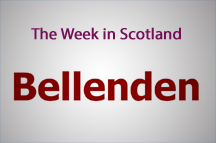 The SNP was in buoyant mood after its three day conference in Aberdeen, earlier in the month, had been seen by many as a success. First Minister Nicola Sturgeon earned plaudits from some quarters for an assured performance, not least in regard to successfully managing expectations amongst SNP grassroots members, who had been agitating for a second independence referendum.
The SNP was in buoyant mood after its three day conference in Aberdeen, earlier in the month, had been seen by many as a success. First Minister Nicola Sturgeon earned plaudits from some quarters for an assured performance, not least in regard to successfully managing expectations amongst SNP grassroots members, who had been agitating for a second independence referendum.
Between the close of conference and the return of MSPs to Holyrood, which re-convened on Monday this week, that mood amongst the party’s MSP has somewhat dampened. First, there was news last week that Tata Steel was to close its two plants in Motherwell and Cambuslang, effectively ending Scottish steel production. Though the Scottish Government had been seen as taking an active role in trying to solve the crisis, little progress had been made in securing the future of the sites and the economic impact of the closure will be felt in local communities for years to come.
Higher Education Governance Bill
 While ministers are escaping blame on the steel issue, the same cannot be said in the area of higher education policy, which was subject to a Scottish Conservative debate on Wednesday as new official figures revealed that the poorest Scottish university students were now facing record levels of debt.
While ministers are escaping blame on the steel issue, the same cannot be said in the area of higher education policy, which was subject to a Scottish Conservative debate on Wednesday as new official figures revealed that the poorest Scottish university students were now facing record levels of debt.
These record levels of debt has led some to now question the SNP’s flagship free university tuition policy, and the party’s proposals in the Higher Education Governance Bill also came under renewed scrutiny during Wednesday’s Holyrood debate. Draft clauses in the Bill, aimed at shaking up the governance structures of universities, faced vocal opposition. Non SNP MSPs claimed both that the proposals would damage private investment in universities, and that the Bill was unnecessarily meddlesome. Whilst the Education Secretary, Angela Constance MSP, defended the legislation, the Opposition Parties felt this was an issue where political points could be scored against the SNP government. Opposition to these measure will continue, as Opposition MSPs line up with Scotland’s Academic Establishment to challenge the Scottish Government.
Dog’s dinner
Whilst attention has been focused on the SNP, Scottish Labour leader Kezia Dugdale has been pushing for more autonomy for Scottish Labour within UK Labour and had thought she had reached agreement with Labour leader, Jeremy Corbyn over the devolving of certain powers. However, a senior Labour source this week branded the plans a “dog’s dinner” that wouldn’t find wider purchase in the party.
This weekend’s Scottish Labour conference, which starts on Friday in Perth, will give an indication of the fortunes of the Labour Party in Scotland and of the state of the relationship between Corbyn and Dugdale. Equally telling will be Labour’s line-up of MSP candidates with focus on the success of candidates backed by the left wing faction - Momentum - in securing selection, particularly in the regional top-up lists, giving a clear indication of the direction of travel for Scottish Labour.
Islands Bill consultation
 Away from party politics a new study published this week found that those living in the Outer Hebrides, Orkney and Shetland constitute some of the most prosperous people in the UK. With a consultation now open on a new ‘Islands Bill’ it will be interesting to see how the Scottish Government reacts to demands from islanders seeking more autonomy - with a culturally distinct population keen to secure more power from what many islanders view to be an out-of-touch and remote Scottish government. How the Scottish Government reacts to a challenge to its authority will be very revealing.
Away from party politics a new study published this week found that those living in the Outer Hebrides, Orkney and Shetland constitute some of the most prosperous people in the UK. With a consultation now open on a new ‘Islands Bill’ it will be interesting to see how the Scottish Government reacts to demands from islanders seeking more autonomy - with a culturally distinct population keen to secure more power from what many islanders view to be an out-of-touch and remote Scottish government. How the Scottish Government reacts to a challenge to its authority will be very revealing.
The next few weeks before Christmas will give a clear indication of the platforms that the various parties will put before the electorate in the run up to the Scottish Parliamentary Elections in May 2016. Looking at the policies being put forward by the parties and those they have selected as candidates may tell you more about the direction of the parties than just relying on their public statements.














